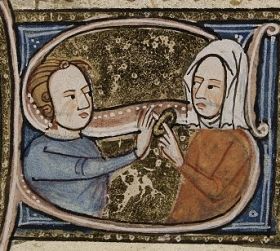293. The Good Wife: Gender and Sexuality in the Middle Ages
Medieval attitudes towards homosexuality, sex and chastity, and the status of women. Authors discussed include Aquinas, Catherine of Siena, and Chaucer.
Themes:
• P. Allen, The Concept of Woman, vol.1: the Aristotelian Revolution, 750BC-AD 1250 (Montreal: 1985).
• A. Blamires, The Case for Women in Medieval Culture (Oxford: 1997).
• V.L. Bullough and J.A. Brundage (eds), Handbook of Medieval Sexuality (New York: 1996).
• C.W. Bynum, Holy Feast and Holy Fast: the Religious Significance of Food to Medieval Women (Berkeley: 1987).
• C.W. Bynum, Fragmentation and Redemption: Essays on Gender and the Human Body in Medieval Religion (New York: 1992).
• C. Dinshaw and D. Wallace, Cambridge Companion to Medieval Women’s Writing (Cambridge: 2003).
• P. Dronke, Women Writers of the Middle Ages (Cambridge: 1984).
• M.H. Green, Making Women’s Medicine Masculine: the Rise of Male Authority in Pre-Modern Gynaecology (Oxford: 2008).
• M.D. Jordan, The Invention of Sodomy in Christian Theology (Chicago: 1997).
• K. Pratt and C.W. Marx (eds), Woman Defamed and Woman Defended (Oxford: 1992).
• C. Muessig, G. Ferzoco and B.M. Kienzle (eds), A Companion to Catherine of Siena (Leiden: 2012).
• A.B. Mulder-Bakker (ed.), Seeing and Knowing: Women and Learning in Medieval Europe 1200-1550 (Turnhout: 2004).
• M. Turner, The Wife of Bath: a Biography (Princeton: 2023).







Comments
Additional bibliography on Episode 292
Works of Ruth Karras would be excellent addition to your bibliography:
Ruth Mazo KARRAS, Sexuality in Medieval Europe: Doing Unto Others (New York: Routledge, 2005)
Ruth Mazo Karras, From Boys to Men: Formations of Masculinity in Late Medieval Europe (Philadelphia: University of Pennsylvania Press, 2002)
Ruth Mazo Karras, Unmarriages: Women, Men, and Sexual Unions in the Middle Ages (Philadelphia: University of Pennsylvania Press, 2012)
Ruth Mazo Karras
In reply to Additional bibliography on Episode 292 by Monica Green
Karras
Great, thanks Monica! (Did you listen to the episode yet? At one point I quote from your work, I think about the misogynist book from Chaucer's Wife of Bath.)
In general I think the potential literature on this is vaster than any topic I have covered for the whole middle ages. Thanks for this pointer for me and the listeners, and maybe other people will have further recommendations.
Christine de Pizan
Do you know if you'll do an episode on Christine de Pizan? Her text, The Book of the City of Ladies, is definitely worth our while from a philosophical point of view. (On big topic is Epistemic Injustice in relation to moral / intellectual equality of men and women.)
In reply to Christine de Pizan by Scott M. Williams
Christine
I am a BIG FAN of her and in fact have found a way to cover her twice, sort of. In the upcoming episode on Jean Gerson I cover the debate over the Romance of the Rose, and Christine appears there as a critic of course. Then I have actually already written a further episode on her other works, but you will have to wait for that - it will appear towards the start of the Renaissance series.
Infertility
Thank you for a well-balanced discussion on a subject which is often treated in a lurid manner. I would observe that there is one point in which I would quibble a little - the question of infertile couples, and the licitness of this. It was generally accepted that it was is because they did not take active steps to make themselves infertile.
However, there is an interesting link between infertility and grounds for marrital annulment. Upon entering a marriage, if one party knows that he or she is infertile and does not inform the other party, then the marriage is not considered valid - it is called a defect of person. If, on the other hand, the other party is informed and still goes through with the marriage, then it is considered valid.
Add new comment